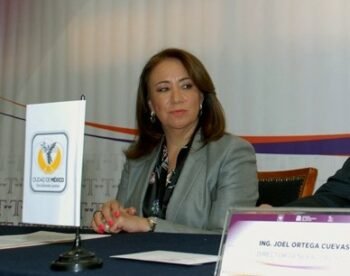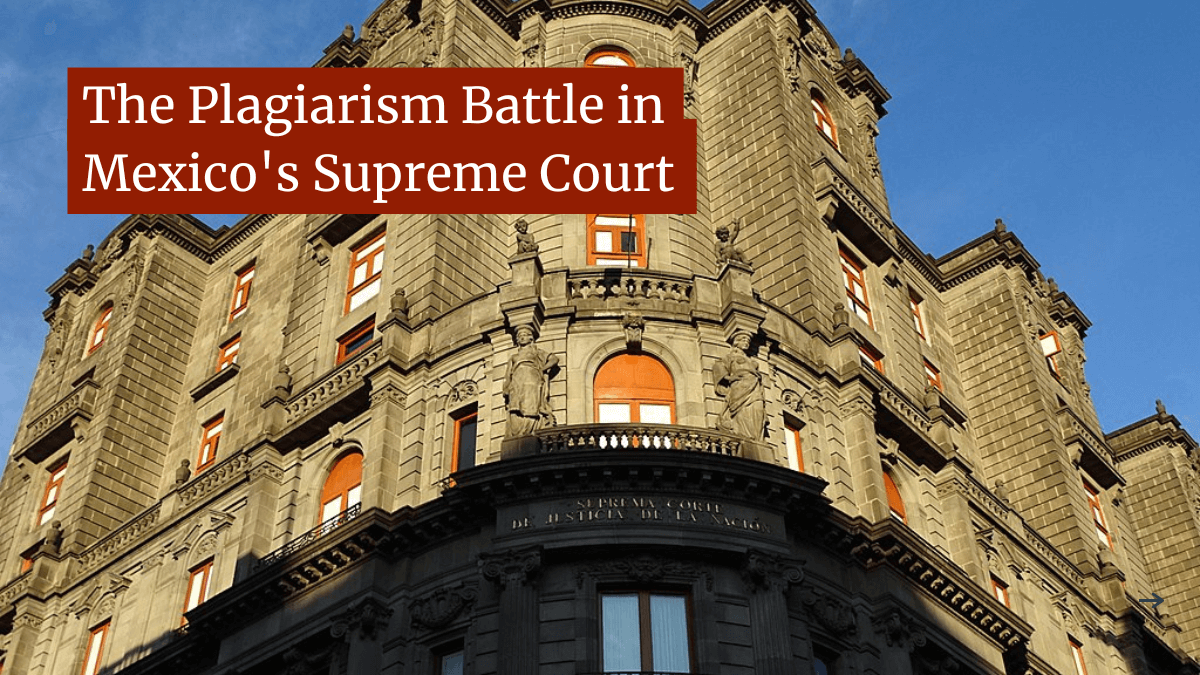The Plagiarism Battle in Mexico’s Supreme Court

Back in December, a faculty member at the National Autonomous University of Mexico (UNAM) alleged that that Supreme Court Justice Yasmín Esquivel Mossa had plagiarized significant parts of her 1987 undergraduate thesis.
The timing of the allegations could not have been worse for her. That thesis was part of the requirement for her law degree, and Esquivel was in a heavily-contested election to become the head of the Supreme Court.
Though it’s unclear if the story harmed her candidacy, she lost that election early in early January. However, she still remains a justice on the court itself.
While that could have been the ending to this story, it ended up being just the beginning.
About a week after the election, UNAM responded to the allegations, saying that it had performed an investigation and found that Esquivel had heavily plagiarized her thesis. However, the university was quick to add that it lacked the power to revoke Esquivel’s degree and said that the matter needed to be referred to Mexico’s education ministry.
This prompted a strong response from Mexico’s President, Andres Manuel Lopez Obrador, who appointed Esquivel to the court. He said that the plagiarism, whether it was real or not, was the product of “political scheming”.
Though he said that plagiarism was never acceptable, he accused his opponents “flying the flag for ethics” for political gain.
Things took a more bizarre turn as, in late January, the lawyer whose thesis Esquivel is accused of plagiarizing, Edgar Ulises Báez, admitted to plagiarizing the thesis he wrote from her. He claimed this even though his thesis was a year before Esquivel’s. This has led some to believe that their academic advisor may have sold them pre-written essays, as the school found three other nearly identical theses from the same time.
Things got even more tense a week later when a court handed down an injunction against UNAM, barring the school from talking about the case at all. Though that injunction was eventually lifted, there was concern about the government attempting to hide evidence in or quash discussion of the case.
That, in turn, brings us to the final twist in the story, as this week, local newspaper El Pais conducted an investigation into her doctoral thesis and found plagiarism in that as well. However, since her PhD is not a requirement for her law degree, it may not have any bearing on whether she can continue to serve as a justice.
Through it all, Esquivel has denied any wrongdoing and has stood behind her work. She has further echoed sentiments that the allegations are politically motivated.
That said, between the ruling of UNAM and the nature of the plagiarism itself, it’s very hard to dispute the accusations, Even though there are some strange wrinkles, the case itself is actually very straightforward.
Understanding the Allegations
If we, for a moment, set aside the politics and theatrics around the case, both sets of allegations are very straightforward.
With Esquivel’s undergraduate thesis, she is accused of having a nearly identical thesis to a student who had presented theirs a year earlier. The similarities include whole paragraphs copied and pasted, nearly identical cover pages, as well as indexes and sections in the first chapter.
With her doctoral thesis, things are even more clear. According to the original El Pais report, some 209 pages of the document’s 456 were copied verbatim from 12 authors, with no quotation marks and limited other citation. Authors who produced the copied works have confirmed the plagiarism to El Pais.
In both cases, the copying is more than enough to be clear. These were, quite simply, copied works.
However, there is a serious question of where the works were copied from. Though the doctoral thesis seems to have a pretty clear and straightforward history, one the original authors confirm, the undergraduate one has become mired in controversy.
There, the person initially believed to be the victim, Báez, has since claimed that he plagiarized Esquivel, not the other way around. This is in spite of the fact that Báez published his a year before Esquivel. That’s been further compounded by the fact that UNAM has found three other similar theses from this time period.
The allegations that Báez plagiarized Esquivel simply doesn’t make sense from a timeline standpoint. Though it is likely that Esquivel began her thesis before Báez submitted his, that only means that Báez likely started his even sooner. Things are made even more complicated by health issues Báez is dealing with, which contradicts some of the things he’s said to have done, such as signing a document acknowledging his plagiarism.
Given the proximity to one another and the discovery of the other papers, what is most likely they both plagiarized but from the same source. Where they obtained that source and how they used it is a matter that needs to be investigated.
However, such an investigation is nearly impossible. These theses are nearly 40 years old. As we discussed last week, such old cases are difficult to investigate because evidence is gone, memories have faded and individuals involved are not around. This is part of why many schools have stopped such investigations.
However, this may not matter quite as much in this case. The evidence of copying is clear and there is a very clear timeline. The only real question is whether Esquivel plagiarized Báez or if the two had a common source. The overlaps are just too great to ignore and this is backed by the findings from UNAM.
As for the doctoral thesis, that one simply explains itself. It’s far too much text from far too many uncited sources to be anything other than plagiarism. Once again, there’s a clear timeline and, in this case, the authors have confirmed the plagiarism.
In short, despite the complexities, there’s not much doubt that plagiarism took place. The only difficult decisions are to decide what happens to Esquivel’s degrees and her current position.
The Political Problem
While all of this seems straightforward, it becomes much less so when looked at through the prism of politics.
When President López Obrador says that these allegations are politically motivated, he’s not wrong. Given that there are four other theses that share similarities with Esquivel’s, it seems unlikely that hers would have been investigated at all had it not been for her political position.
This doesn’t mean that the allegations are wrong. As we saw in the scandal involving Senator John Walsh, political opponents can and do point out very real and very serious instances of plagiarism. In that case, he lost the election, though he was behind before the scandal, and also lost his degree.
However, this does mean that the allegations have to be viewed through that prism and try our best to separate the politics from the case. After all, the people bringing the case aren’t doing so in the interest of academic integrity, but in the interest of harming a political opponent.
But the same has to be done with the defense of Esquivel. Her defenders are just as politically motivated as her detractors. Once again, the primary interest isn’t in academic integrity, but in advancing a political position.
No matter what decision is made in regard to Esquivel, it has to be made free of political motivations. However, that is almost impossible to do and, even if one can, it’s almost guaranteed that many will still feel that it was politically motivated, especially those on the “losing” side.
In short, I don’t envy those having to investigate this case, even if the facts appear to be fairly clear.
Bottom Line
This is the very definition of a loaded case. A tense political climate and a divisive public figure make an explosive mix for any plagiarism case.
The facts themselves seem straightforward. There’s simply too much copying to deny that plagiarism took place. While I agree that Báez is an unreliable witness in this case, we still have physical evidence and the fact that, without time travel, there’s pretty much no way he could have plagiarized Esquivel.
However, it seems to be much more likely that they are both plagiarists, simply copying from the same or a similar source.
In the end, the ones that are hurt most directly by this are the students and graduates of UNAM. Their school is widely seen as one of the most prestigious in Latin America and this scandal has done significant damage to that reputation.
While the school has done what it can, namely having a quick and transparent investigation, the story raises serious questions about the degrees awarded in that era.
Though the school said it will be adopting tools to detect plagiarism in the future, that’s a today solution for a problem that is nearly 40 years old. Whatever help such tools give moving forward, it doesn’t address the past issues.
That would require a much larger investigation that is unlikely to happen, especially since the school feels it can’t revoke degrees. What would the point be of the school investigating prior students if it can’t act on them?
That, in turn, creates a long-term harm that will impact everyone that passes through the halls of UNAM, regardless of what happens to Esquivel.
Header Image: Adam Jones from Kelowna, BC, Canada, CC BY-SA 2.0, via Wikimedia Commons
Inline Image: Gobierno de la Ciudad de México, CC BY 4.0, via Wikimedia Commons
Want to Reuse or Republish this Content?
If you want to feature this article in your site, classroom or elsewhere, just let us know! We usually grant permission within 24 hours.
